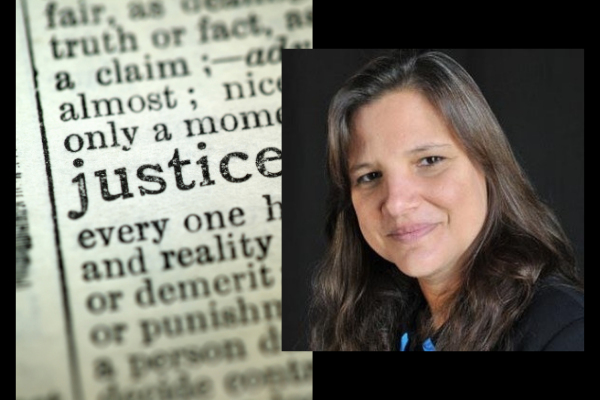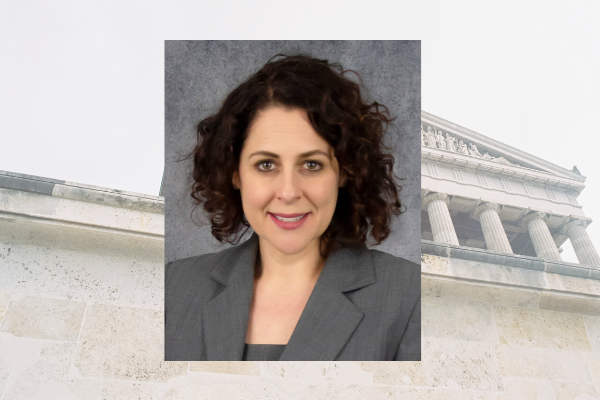Name: Toni-Anne Nunez
Location: Highlands Ranch, CO
What do you do?
I am the Director of Metro Volunteer Lawyers, the pro bono arm of the Denver Bar Association.
What does a typical day look like for you?
My day-to-day really is working with my staff and making sure that they are supported as much as they can be. I have the privilege of working with wonderful people — we are like a little family. In addition to supporting staff, I promote MVL in the community, work with attorneys, assist with fundraising and grant writing, and work with DBA staff and the community.
What is the relationship between MVL and Colorado Legal Services (CLS)?
MVL is housed in the CLS building. They donate office space which we are very grateful for. CLS assists clients at or below 200% of the poverty guidelines, so we follow that same rubric. CLS also does 85% of all of our intake. When people call in, they get screened and go through the application process, after which they are filtered to the appropriate geographic office. If they are filtered to Denver, they do a second screening to see if the case is appropriate for MVL. To a large extent we are the overflow for CLS. Every case that they send to us that they do not have the resources to help with we try to take and provide legal services for.
54 years ago, MVL was started as the Thursday Night Bar. A group of civil-minded attorneys met on Thursday nights to decipher and distribute pro bono cases. As MVL grew, our clinics were developed so that we could help additional clients and provide attorneys an opportunity to volunteer their time on an unbundled or limited scope basis while still having a huge impact on people’s lives. There will always be a need for attorneys to volunteer and take cases on a full referral basis but the clinics provide additional pro bono opportunities.
What do you like most about what you do?
Working with staff is probably my number one joy. We truly are a family. My second favorite part is the opportunity. I feel like I have the best of both worlds. I get the opportunity to work with the legal community to figure out how we can solve high-level systemic access to justice issues, while at the same time, provide direct legal services to those in need. Attending clinics and advising clients one-on-one on a limited scope basis provides me with a different perspective. It’s different representing clients on a pro bono basis. We’re often educating our attorneys about the nuances of this kind of representation. Many attorneys don’t necessarily know the steps to waive filing fees or suppress an address on a pleading, or the significant impact domestic violence can have on the dynamics of negotiating. We may have a client who is homeless or living out of a shelter. There are a lot of issues that are very pertinent to the community we serve that a lot of people may not be aware of.
How do you define success?
Success for me is that people are listening, paying attention to those in need and trying to help where they can. I don’t feel anybody should be guilted into doing pro bono work; however, I do believe that people have an obligation to do pro bono work.
People will say to that they cannot provide pro bono legal assistance because they do not have the time and that they already donate time to their church or children’s school or sports team. My response is always the same, you can and should give time to your church and support your children’s activities but you can also give time to pro bono work. It’s more about how you choose to spend your time.
We have a special skillset as legal professionals. So yes, while I can volunteer in my local church or my local food bank, the quality of what I can provide there is significantly less than the quality of what I can provide to a client who needs legal advice.
What inspired you to go to law school and what was your journey from that inspiration to where you are now?
I was born and raised in Trinidad in the West Indies. I attended high school, undergrad, and law school all in Canada. I always wanted to be a lawyer. I was taught and accepted from a very young age that, “there for the grace of God go I.” Someone who is homeless or in crisis could easily be us, and that there will always be those who are less fortunate and need our assistance. I think the combination of my family dynamic and growing up in a third-world country propelled me to want to be a lawyer and want to help others.
What brought you from Trinidad to Canada?
Trinidad is a beautiful island, but there was not a lot of economic opportunity. A lot of Trinidadians make the choice to educate their children abroad. The educational system’s phenomenal in Trinidad. It’s based on the British system, but my father felt that if we got educated in Trinidad, we wouldn’t be recognizable to the rest of the world, should we choose to move abroad.
After law school, what did you do?
In Canada, we do something called “articling”. It’s an internship that is mandatory before you are allowed to be admitted to the practice of law. You match with a firm and work with them for a full year getting practical experience. I worked for the largest law firm in Canada. We primarily represented large corporations and banks.
After the internship, one of my brothers, who lived in Colorado, encouraged us to move to Colorado, and here I am 27 years later.
What is your go-to wellbeing activity?
I lean a lot on my family, and they lean on me. My three boys and I are really close, and two of them live with me right now. Family is a big healing piece for me. It makes sure that I don’t work too much. I confess to be a bit of a workaholic, and with my commute before COVID, I was probably spending more time than I should have not only in the office but on the road back and forth. When we first began to stay at home after COVID, I definitely had a difficult time separating work from home. Work was always there, so I could always do it. It took me a couple weeks, but I finally adjusted and determined that I needed to set those boundaries so that I walk away from it at some point in the day.
I was also doing yoga before my local facility was closed. I still walk around my neighborhood. I meditate daily which is a big part of my refocus and wellbeing. I try to read books that are inspiring to me. I sometimes listen to podcasts. I just completed listening one of Brene Brown’s podcasts recommended by Jessica.
If you could wave a magic wand and change one thing about the legal profession, what would it be?
I think it would be for people to recognize that they have a specific skillset that they should share with others with an acknowledgement and recognition that pro bono isn’t something somebody else should do. It’s something that we all should do – while making a living and while being effective. I think that everyone should realize that our society needs help. The more that we empower people who are in pain and who need guidance, the better everyone will be. A rising tide lifts all boats. If people get assistance will their legal needs, they will be more productive, have better jobs, and better support their families. I think that would be my magic wand request: a realization that this work is critical to our world being a better place and that we should be dedicated to that cause.
What is one new thing you are hoping to learn from others in this community?
The reason that I joined this community is because it is comprised of some phenomenal and powerful individuals who are really interested in changing the way that attorneys practice to allow for a healthier lifestyle. This community allows me to look at my choices and our profession and reflect on how we can be better.
The other piece is that I learn from the information being shared. It allows us to open theoretical doors and see different perspectives. We have such great resources in this community; we should learn from each other. Let’s move the needle. Let’s actually figure out how we can be better.
And what is one thing you are looking to share with others in this community?
Recognizing the systemic need for nonprofits to succeed, for funding the causes, and being aware of what’s going on in your community. The self-care piece is also huge for me, just to hear different perspectives. I think that this group has the opportunity to provide different perspectives. We do need to listen to the traditional attorney. Everyone has value to contribute and share things that they have done, or their life experience, or where they are at this point in their careers and lives. I believe that sharing stories and experiences will help everyone think, “I never thought of it that way” or “That’s a different way to approach things.”





